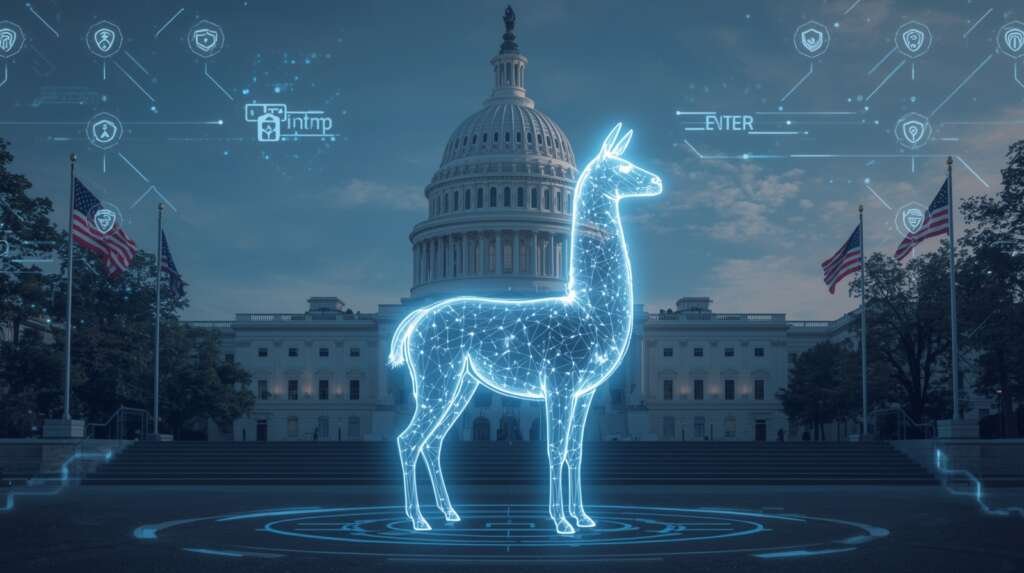Meta Platforms Inc. is pushing ahead with its ambitious artificial intelligence strategy, as recent moves suggest growing integration of its AI tools into government, media, and infrastructure sectors. From U.S. federal adoption of its Llama AI system to licensing discussions with major news publishers and potential multi-billion-dollar cloud contracts, Meta’s various AI initiatives are accelerating on multiple fronts.
U.S. Government Opens Door to Llama
The General Services Administration (GSA) added Meta’s Llama AI to its list of approved tools. That means U.S. agencies can now test Llama for tasks like contract reviews, IT support, and data analysis.
The approval places Meta in an elite group. Amazon, Microsoft, Google, OpenAI, and Anthropic already have systems on the federal list. Llama now stands beside them.
This is a breakthrough for Meta. Government certification signals that Llama meets key security and compliance standards. It also opens doors for adoption across multiple agencies.
Media Licensing Talks Begin
Meta is also negotiating with publishers to license news content for its AI models. Partners under discussion include Axel Springer, Fox Corporation, and News Corp.
Licensing would let Meta legally use articles to train and power its AI assistants. It could also help improve accuracy and reduce the risk of spreading false or outdated news.
Not all talks will end in deals. Still, if Meta secures agreements, it could gain an edge over rivals by offering fresher and more credible AI-generated information.
A Possible $20 Billion Cloud Deal
Meta’s appetite for computing power is enormous. Reports suggest it is in talks with Oracle on a contract worth as much as $20 billion.
Such a deal would give Meta huge cloud capacity to train and deploy its AI systems. For Oracle, it would mark one of the largest wins in the cloud sector.
Meta’s rivals also spend heavily on infrastructure. Microsoft has Azure. Google has its own data centers. A tie-up with Oracle would show Meta is willing to match or surpass them in scale.
Investor Confidence Stays Strong
Analysts continue to back Meta’s AI strategy. Canaccord Genuity reaffirmed a “Buy” rating with a price target of $900 per share.
They cite Meta’s fast rollout of AI tools, new hardware like smart glasses, and early signs of revenue growth from AI services.
Investors see risk, but they also see Meta’s cash-rich ad business as a cushion. That gives the company room to spend big on AI without threatening short-term stability.
Internal Restructuring
Inside Meta, change is constant. The company has reorganized its AI division multiple times this year. The latest structure, called Meta Superintelligence Labs aligns research, infrastructure, and product teams.
The goal is to speed up innovation. But frequent changes can disrupt projects and unsettle employees. Whether the reshuffle improves execution remains to be seen.
Risks on the Horizon
Meta’s AI push is bold, but not risk-free.
-
Content Deals: Licensing agreements could trigger legal disputes over copyright, attribution, and payments.
-
Government Use: Federal agencies may move slowly, and watchdogs could raise privacy concerns.
-
Costs: Spending billions on cloud, hardware, and R&D may not yield profits quickly.
-
Reputation: Missteps in AI deployment- bias, misinformation, or data misuse. This could spark backlash.
These risks explain why some analysts urge caution, even as they recognize Meta’s strong momentum.
Why It Matters
-
Govt AI Tool Standardization: With Llama now approved for U.S. government evaluation, Meta is well-positioned to become a major provider of AI tools for public sector uses, which may include policy, defense, regulatory, and administrative applications. The certification by GSA is a signal that Meta’s security protocols and legal compliance meet federal standards.
-
Content Licensing Will Shape AI Outputs: How Meta structures its licensing agreements with news publishers will influence what content its AI models rely on, potentially affecting bias, scope, and credibility of AI outputs. Deals that succeed could serve as templates for the rest of the industry.
-
Infrastructure Investment & Cloud Partnerships: If the Oracle-Meta cloud deal moves forward, it will underline the importance of scalable, secure, and high-performance computing capacity. For Meta, whose AI model training and deployment are compute-intensive, partnerships like this may reduce latency in development and open doors for more ambitious AI projects.
-
Investor Sentiment & Financial Sustainability: The reaffirmed analyst confidence shows that markets believe Meta’s AI bets can pay off. But it’s not without worry—balancing ongoing costs, R&D losses, hardware development hurdles, and regulatory pressures will be crucial.
If Meta executes well, it could shape how AI enters government, media, and consumer spaces all at once.
Meta is clearly doubling down on AI, not just in marketing or experimentation, but in gaining official government approval (Llama), securing content and media licensing deals, investing heavily in infrastructure, and reorganizing internally. The scale of its ambition is heavy, and so are the associated stakes.
If these pieces fall into place, government certification, strong licensing agreements, reliable infrastructure partnerships, and effective monetization- Meta could be one of the defining players in how AI is deployed in both public and private sectors in the coming years. But execution, oversight, and transparency will likely determine whether its AI strategy becomes a long-term success or a high-cost gamble.




